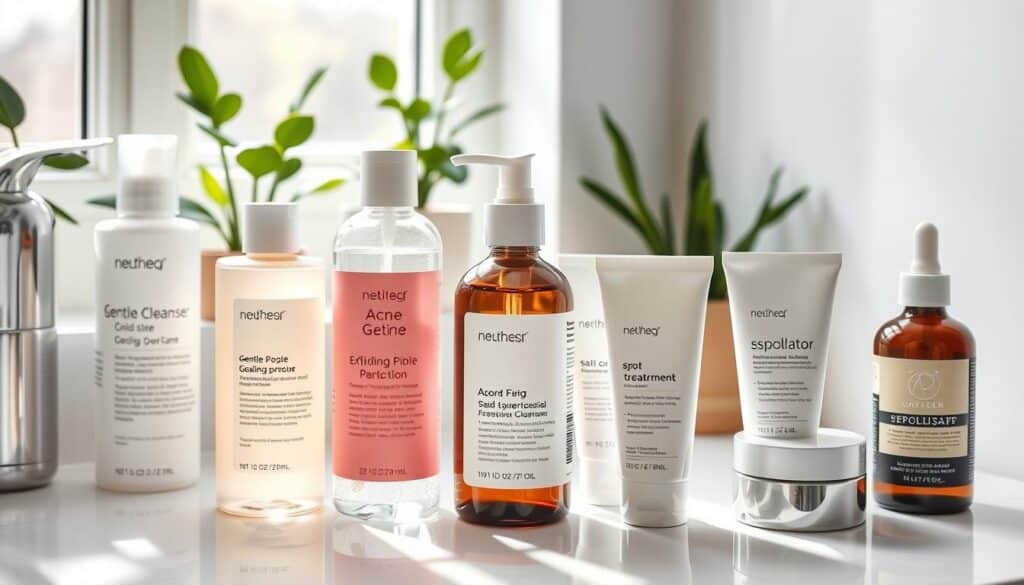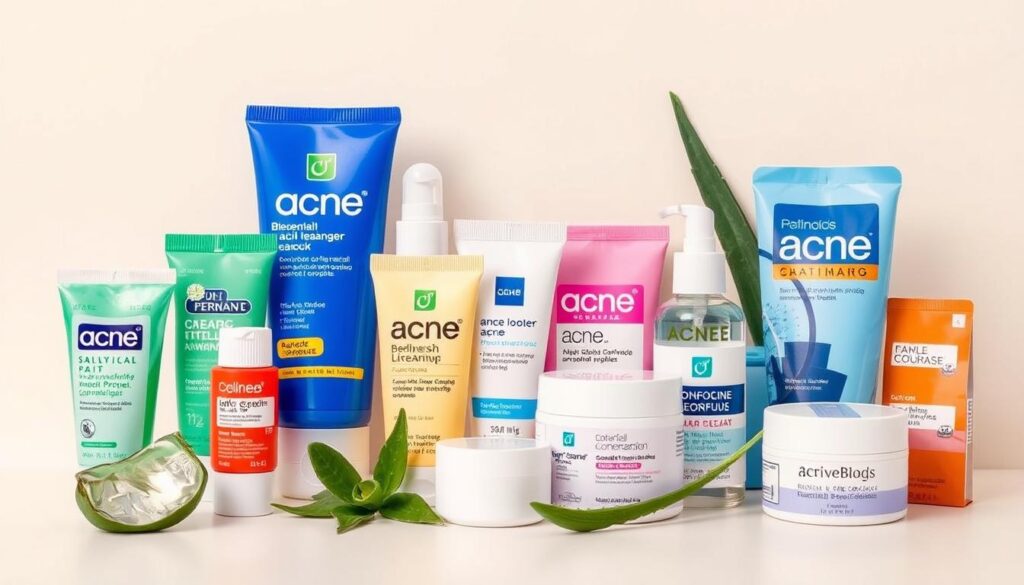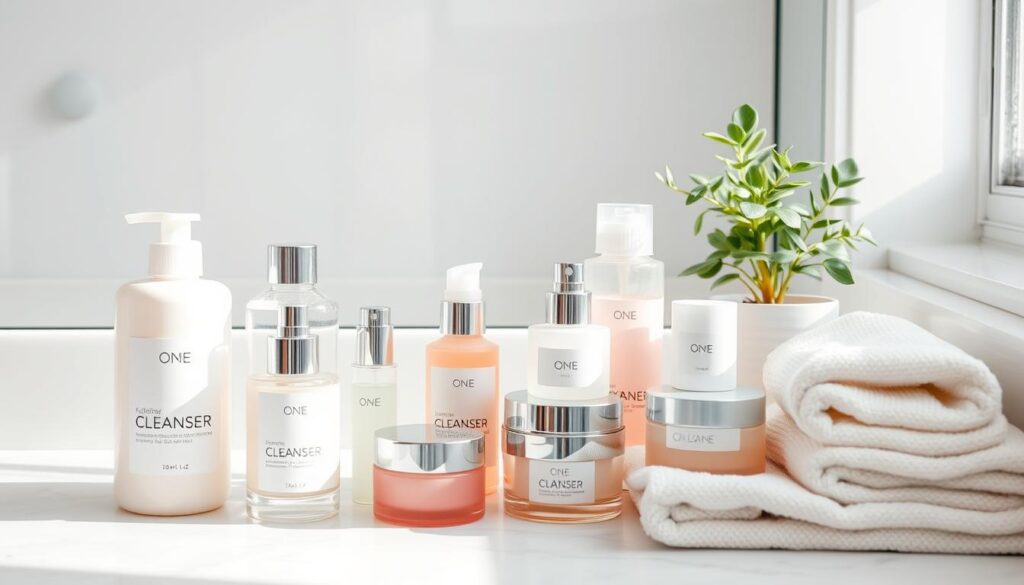Acne is a common skin issue that can be managed well with the right treatments and skincare. This article looks at different clear skin solutions. We’ll cover over-the-counter products, prescription meds, and lifestyle changes. We’ll talk about key ingredients like benzoyl peroxide, salicylic acid, and retinoids. Plus, we’ll share skincare routines and lifestyle tips for clear skin.
Key Takeaways
- Acne can be effectively managed with the right combination of treatments and skincare routines.
- Effective ingredients for clear skin include benzoyl peroxide, salicylic acid, and retinoids.
- Comprehensive skincare routines and lifestyle modifications can help achieve and maintain clear skin.
- Over-the-counter products and prescription medications can be effective in fighting acne.
- Stress management and dietary changes are important for clear skin.
Understanding Acne and Its Root Causes
Acne is a common skin problem that affects people of all ages. It’s estimated that 9.4 percent of the global population has it. In the United States, it’s the most common skin issue. Several factors contribute to its development.
Different Types of Acne Breakouts
Acne can show up in many ways, like whiteheads, blackheads, and cysts. Each type can be different in severity and how it responds to treatment.
Common Triggers for Acne Development
Many things can trigger acne, such as too much oil, clogged pores, and bacteria. Hormonal changes, especially during puberty and pregnancy, can also cause it. Stress and a diet high in sugar can make acne worse.
Impact of Hormones and Genetics
Hormonal changes are key in causing acne. During puberty, these changes can lead to more oil and clogged pores. For women, acne can come back a week before their period. Genetics also play a role, making some people more likely to get acne.
Knowing what causes acne is the first step to clear skin. By tackling the root causes, people can manage their acne and get healthier skin.
Essential Clear Skin Solutions for Daily Care

Getting clear, blemish-free skin starts with a daily skincare routine. Focus on gentle cleansing, preventing acne, and keeping your skin hydrated. These steps help control your skin’s health and reduce breakouts.
Start with a gentle, non-irritating cleanser that removes dirt, oil, and makeup without drying your skin. Don’t over-wash or scrub too hard, as it can make acne worse. Look for non-comedogenic products that are safe for acne-prone skin.
Next, use a lightweight, water-based moisturizer to keep your skin hydrated without clogging pores. Remember to protect your skin from the sun with a moisturizer that has sunscreen. This is key to preventing more damage and spots.
- Cleanse twice daily with a gentle, non-irritating cleanser
- Use non-comedogenic, oil-free products to prevent clogged pores
- Apply a lightweight, water-based moisturizer with SPF to hydrate and protect
By adding these essential clear skin solutions to your daily routine, you can fight acne and keep your skin healthy and glowing.
Most Effective Over-the-Counter Treatments

Dealing with acne can be tough, but there are good OTC treatments. Benzoyl peroxide, salicylic acid, and retinoids are effective against different types of acne.
Benzoyl Peroxide Products and Benefits
Benzoyl peroxide fights acne by killing bacteria, removing oil, and exfoliating dead skin. OTC products range from 2.5% to 10%. Lower strengths, like 2.5%, work well without causing dryness or irritation.
Salicylic Acid Applications
Salicylic acid unclogs pores and stops new breakouts. It’s found in 0.5% to 2% strengths, in leave-on and wash-off forms. It’s great for blackheads and whiteheads.
Retinol and Adapalene Solutions
Retinoids, like retinol and adapalene, are strong OTC treatments. Adapalene gel, at 0.1% strength, unclogs pores and stops breakouts. Using retinoids with other ingredients can boost their effect.
Be patient with OTC acne treatments. It may take 2 to 3 months to see results. Start with lower strengths and increase as needed to avoid irritation.
Building a Comprehensive Skincare Routine

To get clear, blemish-free skin, you need a good acne skincare plan. This plan should tackle the main causes of breakouts. By using special treatments in your morning and night routines, you can fight acne and get healthier, brighter skin.
In the morning, start with a gentle face wash that fights acne. Look for ones with benzoyl peroxide or salicylic acid. These help clear pores and lower inflammation. Then, use a light, non-comedogenic moisturizer that won’t block pores. Don’t forget to apply a broad-spectrum sunscreen to shield your skin from UV rays.
At night, wash your face again to remove daily dirt and oil. After that, apply a spot treatment like benzoyl peroxide or a retinol serum. This helps with current blemishes and stops new ones. End with a non-comedogenic moisturizer to keep your skin hydrated and nourished.
Creating a good acne skincare regimen takes time and patience. It might take 2-3 months to see big changes in your skin’s health and clarity. Keep up with your routine, be kind to your skin, and see a dermatologist if you need help.
Lifestyle Modifications for Clearer Skin

Getting clear, radiant skin is more than just using creams and serums. Making lifestyle changes can greatly improve your skin’s health and look. Eating right, managing stress, and exercising regularly are key. These actions help fight acne and make your skin glow.
Dietary Changes for Skin Health
“You are what you eat” is especially true for your skin. Eating wisely can feed your skin from the inside. Cut down on dairy and sugary foods to lessen acne. Eat more lean proteins, fruits, veggies, whole grains, and healthy fats for your skin’s needs.
Stress Management Techniques
Stress can make acne worse. Using stress-reducing methods can calm your skin and lower inflammation. Try meditation, yoga, or deep breathing to manage stress. Also, getting enough sleep helps your skin heal and look better.
Exercise and Skin Benefits
Exercise is good for your health and skin. It boosts blood flow, bringing nutrients and removing toxins. It also releases happy hormones that fight stress and inflammation. Always wash up after working out to avoid breakouts.
By adopting these lifestyle changes, you can improve your skin health in a natural way. A balanced diet, stress control, and regular exercise can tackle acne’s causes. This leads to a brighter, younger-looking skin.
“Healthy skin is the result of a balanced lifestyle, not just a skincare routine.” – Dr. Sarah Villafranco, Dermatologist
Also Read: How To Treat Dark Circles Under Eyes?
Conclusion
Getting and keeping clear skin is a journey. It needs good skincare, regular routines, and lifestyle changes. Over-the-counter treatments like benzoyl peroxide, salicylic acid, and retinoids help many with acne.
Creating a gentle skincare routine that fits your skin type is key. This helps keep your skin clear.
If your acne doesn’t get better after 2-3 months, see a dermatologist. They can offer prescription treatments. Being patient and consistent is important for clear, healthy skin.
By using the right skincare and making healthy lifestyle choices, you can manage acne. This brings confidence and radiant skin.
The journey to clear skin has its ups and downs. But with the right knowledge and effort, you can beat acne and keep your skin glowing. Stick to your skincare routine, watch out for triggers, and get help when you need it. With the right approach, you can get and keep the clear skin you want.
FAQs
Q: What are the best skincare products to promote clear skin for oily skin?
A: To promote clear skin, look for skincare products containing ingredients like salicylic acid, which helps clarify pores, and niacinamide, which can improve skin texture and hydration. Additionally, products from Image Skincare that focus on oil control can be beneficial.
Q: How can I improve skin hydration while treating acne?
A: It’s essential to maintain hydration even when treating acne. Using lightweight, non-comedogenic moisturizers that contain ingredients like hyaluronic acid can help hydrate the skin without clogging pores. Look for products that also contain soothing ingredients like camellia sinensis to support a healthy skin barrier.
Q: What role does a compromised skin barrier play in acne?
A: A compromised skin barrier can lead to increased sensitivity and breakouts. It’s crucial to use skincare products that strengthen the skin barrier, such as those containing boswellia serrata extract or sodium lauroyl lactylate, which can help restore barrier function and improve overall skin health.
Q: Are there any specific ingredients I should avoid in skincare products for acne-prone skin?
A: Yes, avoid harsh sulfates like ammonium lauryl sulfate and ammonium laureth sulfate, as they can irritate the skin and compromise the skin barrier. Instead, opt for gentler cleansing agents such as cocamidopropyl hydroxysultaine.
Q: How do customer reviews influence the choice of acne treatment products?
A: Customer reviews can provide insights into the effectiveness of products for treating acne. It’s beneficial to look for products with positive reviews that highlight how well they clarified blemishes and improved skin texture over time.
Q: Can I use exfoliating acids with other acne treatments?
A: Yes, you can use exfoliating acids, such as glycolic or salicylic acid, along with other acne treatments. However, it’s important to start slowly and monitor your skin’s response to avoid over-exfoliation, which can lead to irritation and compromised skin barrier.
Q: What is the importance of brightening ingredients in acne skincare?
A: Brightening ingredients can help to reduce post-inflammatory hyperpigmentation that often follows acne breakouts. Ingredients like melaleuca alternifolia (tea tree oil) and certain forms of vitamin C can enhance skin radiance while treating and preventing future blemishes.
Q: How can I address fine lines while treating acne?
A: To address fine lines while treating acne, look for skincare products that contain retinoids or peptides. These ingredients can help improve skin texture and promote cell turnover, which can benefit both acne-prone and aging skin.
Q: What should I do if my acne treatment causes dryness?
A: If your acne treatment causes dryness, it’s crucial to incorporate hydrating products into your routine. Look for moisturizers with butylene glycol or hydroxypropyl methylcellulose to boost hydration and soothe the skin. Additionally, consider taking breaks from potent treatments to allow your skin to recover.
Source Links
- https://www.cerave.com/skin-smarts/skin-concerns/acne/why-an-acne-routine-is-essential-for-clear-skin
- https://www.healthline.com/health/skin/how-to-get-clear-skin
- https://www.healthline.com/health/skin/acne
- https://www.mayoclinic.org/diseases-conditions/acne/symptoms-causes/syc-20368047
- https://imageskincare.com/products/clear-skin-solutions-blemish-defense-trio?srsltid=AfmBOooLL5EDKCmOP3YgK3UOi7OmHnC59-CJFPdG5KUh3fp_Wy73_n2i
- https://www.medicalnewstoday.com/articles/how-to-get-clear-skin
- https://www.mayoclinic.org/diseases-conditions/acne/in-depth/acne-treatments/art-20045814
- https://trilliumclinic.com/guide-acne-treatment-clear-skin-solutions/
- https://www.truemeds.in/blog/best-acne-treatment-products
- https://info.eminenceorganics.com/skin-care-routine
- https://www.webmd.com/beauty/ss/slideshow-skincare-routine
- https://www.dermalogica.com/blogs/living-skin/build-a-skin-routine
- https://charlestondermatology.com/simple-lifestyle-changes-to-promote-healthy-skin/
- https://vegasvalleyvein.com/skin-care/13-changes-for-healthy-skin/
- https://rasaderm.com/how-diet-and-lifestyle-affect-acne-best-practices-for-a-clearer-skin/
- https://www.ivorywellness.com/post/effective-acne-treatments-clear-skin-solutions
- https://voolgausa.com/blogs/voolga-skin-care-hub/clear-skin-solutions-effective-treatments-for-persistent-acne?srsltid=AfmBOorOJOtUiaxATgkT3kUbQqy7C1QUukvz7_qtGdQ-_ffQNv6M3L7W




